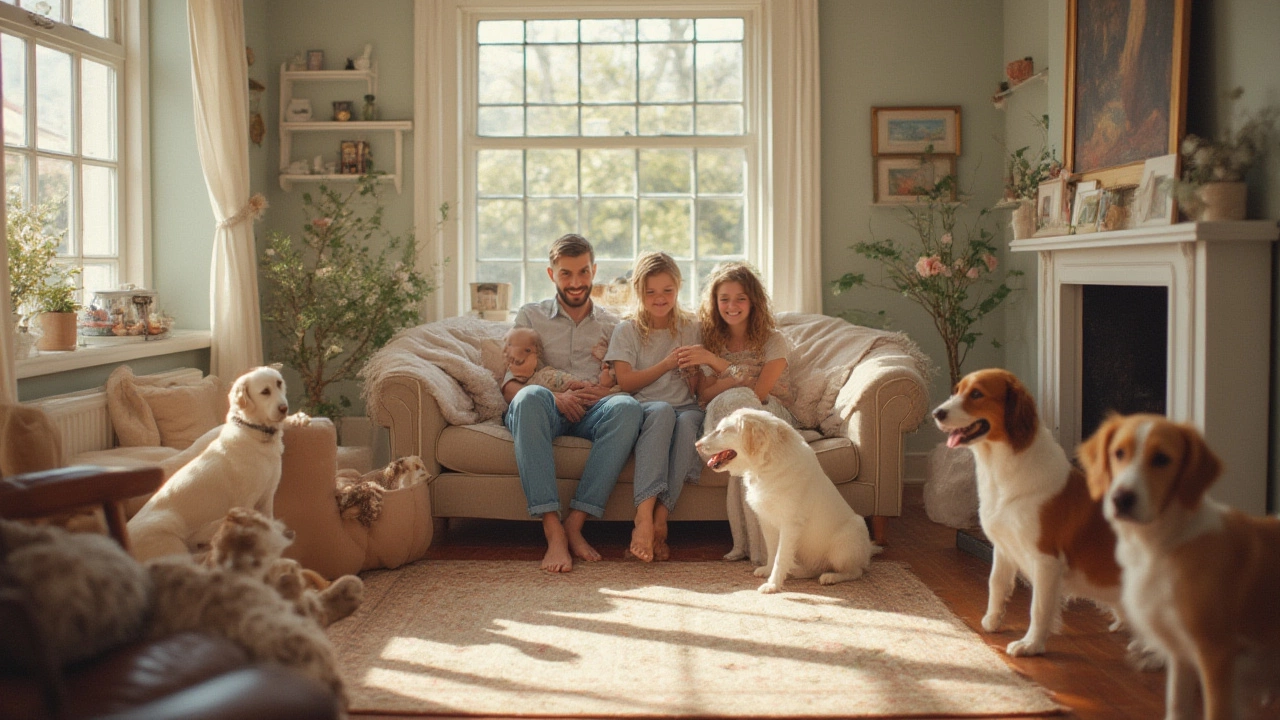Ask three dog lovers about the best dog breeds, and you’ll probably get three different answers. Here’s the thing—there isn’t a single ‘number 1 dog’ that fits every human, lifestyle, or family. Yet, some breeds do stand out in popularity, friendliness, trainability, and all-around compatibility. If you’re trying to figure out what’s truly the top dog, you’re not alone. People in Ireland (and all over) still debate whether Labrador Retrievers, Golden Retrievers, or even the humble mutt deserves the throne. Let’s pull back the curtain and find out what you really need to know when choosing your next four-legged family member.
Why There’s No One-Size-Fits-All Best Dog
Imagine if choosing the number 1 dog was as simple as picking out a loaf of bread. But it’s not, and here’s why: every person and every dog is different. The ‘best’ dog for a busy mum with three small kids in an apartment is different from the top pick for a hiker with endless weekends out in Wicklow. Dogs aren’t just accessories. They have quirks, energy levels, and personalities all their own. According to The Kennel Club in the UK, there are 222 recognized breeds, not to mention the hundreds of crossbreeds and lovable rescue mutts out there. And that’s before you add in things like allergies, garden size, budget for dog food, and how much time you’ll actually spend with your furry friend.
Maybe you’ve heard that Labs are the gold standard. There’s truth to that! Labradors have topped the Irish Kennel Club’s registration list for over ten years. They’re obsessed with their people, are eager to please, and usually get along well with kids and other animals. But that doesn’t mean a Labrador is a fit for everyone. Their insane love for fetch can leave your arm sore. They have a coat that sheds. And, oh yes, they want to eat everything—shoes, socks, actual rocks. The trick is to look at what you want, what you can offer, and what breeds tend to work best in those situations.
Allergies? Hypoallergenic breeds like the Poodle or a Bichon Frisé might be your dream come true. Little space? Small dogs like a Cavalier King Charles Spaniel or French Bulldog could be a better bet than a bouncy Golden Retriever. Fitness junkie? Border Collies and German Shepherds will happily join you on a 10k run… and still ask for more. So if you’re choosing a dog, don’t just Google “number one dog” and buy the first pup you find. Start by writing down your routines, quirks, budget, and dreams for your future together. Dog ownership is about a match, not a title.
The Top Contenders: Breed Deep-Dive
If we’re talking stats, Labradors reign supreme, both globally and here in Ireland. According to Dogs Trust Ireland, they consistently make up one of the largest portions of adoptions, and the Irish Kennel Club’s breed registrations reflect the same. But let’s break down what makes the top contenders so irresistible—and where a few hidden gems shine bright.
- Labrador Retriever: Friendly, loyal, and full of energy. They excel as family dogs and service animals. Just be prepared for a powerful appetite and a need for regular exercise.
- Golden Retriever: Calm, intelligent, and easygoing. These dogs are a dream for families with kids, but their flowing coats require proper grooming.
- Cavalier King Charles Spaniel: Sweet, gentle, and compact. Ideal for smaller homes and a good match for first-timers.
- Poodle: Smart and hypoallergenic. They come in all sizes—Toy, Miniature, and Standard—and are great for people with allergies.
- Mixed-Breed/Rescue: Unique, often heart-meltingly sweet, and can be just as good a fit as any pedigree pup. Rescue dogs sometimes surprise you with the best personalities and loyalty.
Here’s a quick snapshot comparing a few of the most popular breeds for families in Ireland:
| Breed | Average Size | Shedding | Energy Level | Kid-Friendly |
|---|---|---|---|---|
| Labrador Retriever | Large | Heavy | High | Yes |
| Golden Retriever | Large | Heavy | Moderate | Yes |
| Cavalier King Charles Spaniel | Small | Moderate | Medium | Yes |
| Poodle | Varies | Low | High | Yes |
| Rescue/Mixed Breed | Varies | Varies | Varies | Varies |
The truth is, even so-called “perfect” breeds have individuals that are shy, excitable, or stubborn. Meeting the dog before you commit and chatting with breed experts helps dodge surprises later.

What Really Matters: Matching Lifestyle to Breed
Dogs aren’t accessories to your life. They become your life. So, if your heart is set on the ‘number 1 dog,’ ask these questions first. Do I have the patience and time for a puppy? Can I handle daily walks, rain or shine? Am I prepared for grooming, training, and the accidents that come with every new pup? A giant Wolfhound in a tiny city flat? Probably not your best pick (even if they’re Irish icons). A miniature Dachshund as a running buddy? You’ll both be disappointed by mile three.
Here are a few tips to help match the right dog breed to your actual life—not just the life you imagine:
- Space Matters: Dogs like Huskies, Boxers, or Retrievers thrive with access to gardens or parks. If you live in an apartment, think about smaller, more relaxed breeds like French Bulldogs or even retired Greyhounds (believe it or not, they love a good snooze).
- Energy Levels: Collies, Springer Spaniels, and German Shepherds need a ton of exercise and mental stimulation. If you’re outdoorsy, great. If not, look at lower-energy breeds.
- Grooming: Some dogs shed fur like it’s falling snow. If you’re tidy, consider breeds with lower grooming needs, like Whippets or Poodles.
- Kids at Home: Consider temperament and patience. Labradors and Cavaliers excel with children, but even they need respectful handling.
- Work Schedules: If you work full time and the dog will be alone a lot, you’ll need to plan for a dog walker or doggy daycare—or consider a lower-maintenance breed.
Matching your lifestyle isn’t just about breed, either. Age plays a role, too. Puppies are sweet, but they need constant attention and training. Adult dogs from shelters often come house-trained and may have fewer surprises in store. The Irish SPCA says adults are adopted far less than puppies, even though they can be much easier in real life.
Lesser-Known Heroes: Why Mixed Breeds and Rescues Shine
Don’t overlook the mutts. More than half the dogs living in Irish homes are mixed breeds, and rescues regularly report that their mutts are the most grateful and adaptable pets. Mixed breeds often avoid some genetic health issues common to purebred dogs, according to a long-term study by the Royal Veterinary College in England. And there’s something special about giving a home to a pup that truly needs one.
Rescue dogs offer endless variety. Some are high-energy, some are couch potatoes, and a surprising number adapt beautifully to family life. According to Dogs Trust Ireland, over 2,500 dogs found new homes in 2024 alone—everything from Shih Tzu crosses to Collie mixes. Staff at rescue centers get to know their animals well and are excellent at suggesting dogs that match your lifestyle. They’ll tell you up front if a dog is great with kids but terrified of the hoover, or if they need an experienced owner.
Here are some insider tips if you’re thinking rescue or mixed-breed:
- Meet several dogs and stay open-minded. Sometimes the pup who ignores you at first becomes your best friend after a few walks.
- Ask about temperament, history, and daily needs. Some shelters even allow ‘trial weekends’ before you commit.
- Consider adopting older dogs—they usually adapt quicker and don’t destroy shoes like puppies do.
- Prepare a comfy, quiet space at home, especially for rescues who need to settle.
Rescuing a dog isn’t a shortcut—it’s a different path to the same happy ending. And you get serious bonus points with your friends for being a hero to an animal in need.

Practical Tips for Picking the Right Dog (and Living Peacefully Together)
Everyone dreams of that perfect Instagram dog, but real life is a bit messier (and hairier). To get the best start, plan for at least a month of sticky carpets, chewed banister posts, and the odd ‘accident’ on the floor. Here’s what makes the best dog for you truly ‘number 1’ in your home:
- Choose based on personality, not looks alone. Dogs, like people, come with their own quirks.
- Chat with breeders, rescue staff, or dog owners to learn honestly about the day-to-day with your breed of choice.
- Budget for food, vet bills, training, and unexpected mishaps. Dogs cost more than you think—especially over their lifetime.
- Don’t skip socializing your new dog. Early days matter—a confident, positive pup is much easier to live with later.
- Invest time (not just money) in daily walks, play, and cuddles. Boredom creates trouble faster than you’d believe.
Here’s a breakdown of actual average costs you can expect in Ireland, as of 2025:
| Expense | Estimated Monthly Cost (EUR) |
|---|---|
| Food | €40 |
| Vet Checkups | €20 |
| Insurance | €20 |
| Training Classes | €30 (during first year) |
| Toys & Accessories | €10 |
| Pet Sitter/Walker | €40 |
This doesn’t count the priceless value of the slippers you may have to replace, or the muddy paw-prints on your new carpet.
No single breed wins the title for ‘number 1 dog’ outright—your perfect pet might be a pedigree, a rescue, or a waggy-tailed mix from down the street. When you make your choice, focus less on trends and more on what will make you (and your future dog) happiest together. And don’t forget—sometimes, the right dog is the one who chooses you first.

